GENERATIVE ENCOUNTERS–A FIVE-DAY CREATION AND RECIPROCITY
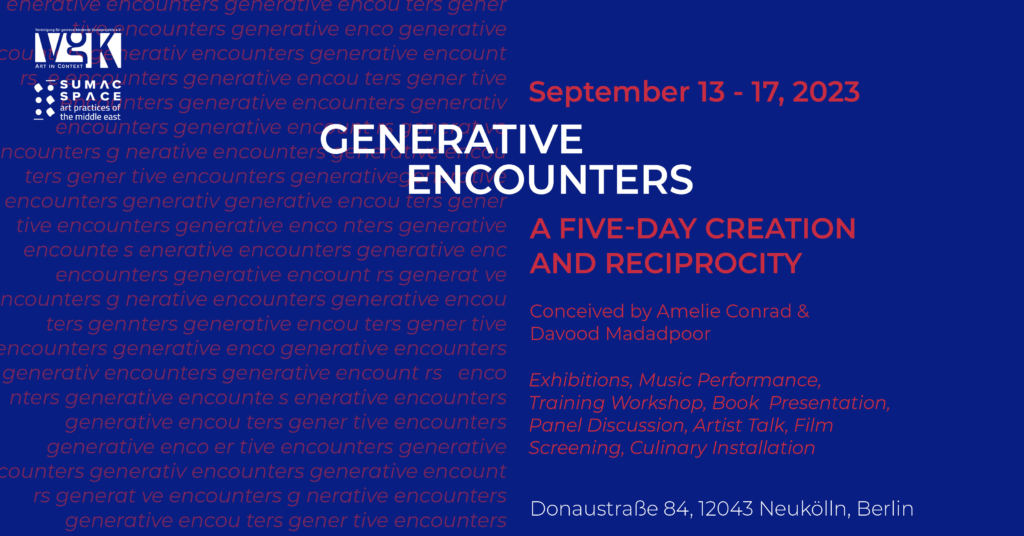
What beautiful days… days filled with conversation, collaboration, and, most importantly, friendship… Thanks to everyone who was a part of it, and special thanks to my dear friend Esra Gültekin for the beautiful images.
Generative Encounters–A Five-Day Creation and Reciprocity
A project by Vereinigung für genreverbindende Kunstprojekte in collaboration with Sumac Space
Conceived by Amelie Conrad / Davood Madadpoor
Generative Encounters–A Five-Day Creation and Reciprocity is a program accompanying the international professional encounters conceived by the Vereinigung für genreverbindende Kunstprojekte in collaboration with Sumac Space. It is designed as part of cultural mediation to engage a young audience.
Generative Encounters continues collaborating with artists and cultural practitioners previously built around Sumac Space and VgK. We aim to create a space for exchange where the outcomes often represent the most visible manifestations of relationships, friendships, and collaborations.
The program encompasses several events: two pop-up group exhibitions (Home, Home, Home, Temporary Home and Farmers of God’s Universe Live by the Click), a book presentation (POSTPOSTPOST: Reflections on a New Avant-garde), a music performance (Mutaradim مُتَرَدِّمْ by Siska and Felix Claßen), Film screening & conversation with Clementine Butler-Gallie & Siska (Studio Baalbeck – An Emerging Lexicon), a three-day workshop in collaboration with the CoFUTURES research project (Science Fictionality: Training Workshop), and a conversation between Sumac Space (Davood Madadpoor), DAr. Design, Architecture, Research (Eliana Martinelli, Cecilia Fumagalli, Chiara Simoncini) and VgK-Art in Context (Amelie Conrad). As a closing event, you are invited to a culinary experience titled SabroSura Sabro: Flavorful Images of the Arab Caribbean, curated by the Instituto de Cultura Árabe de Colombia.
MORE INFO: contact@sumac.space
Day 1: TUESDAY, SEPTEMBER 12
All-day closed event
Day 2: Wednesday, September 13
9 am – 4 pm closed event
Exhibitions Opening Sept. 13, 7 pm
On view Sept. 13-17, 2023, 6-9 pm
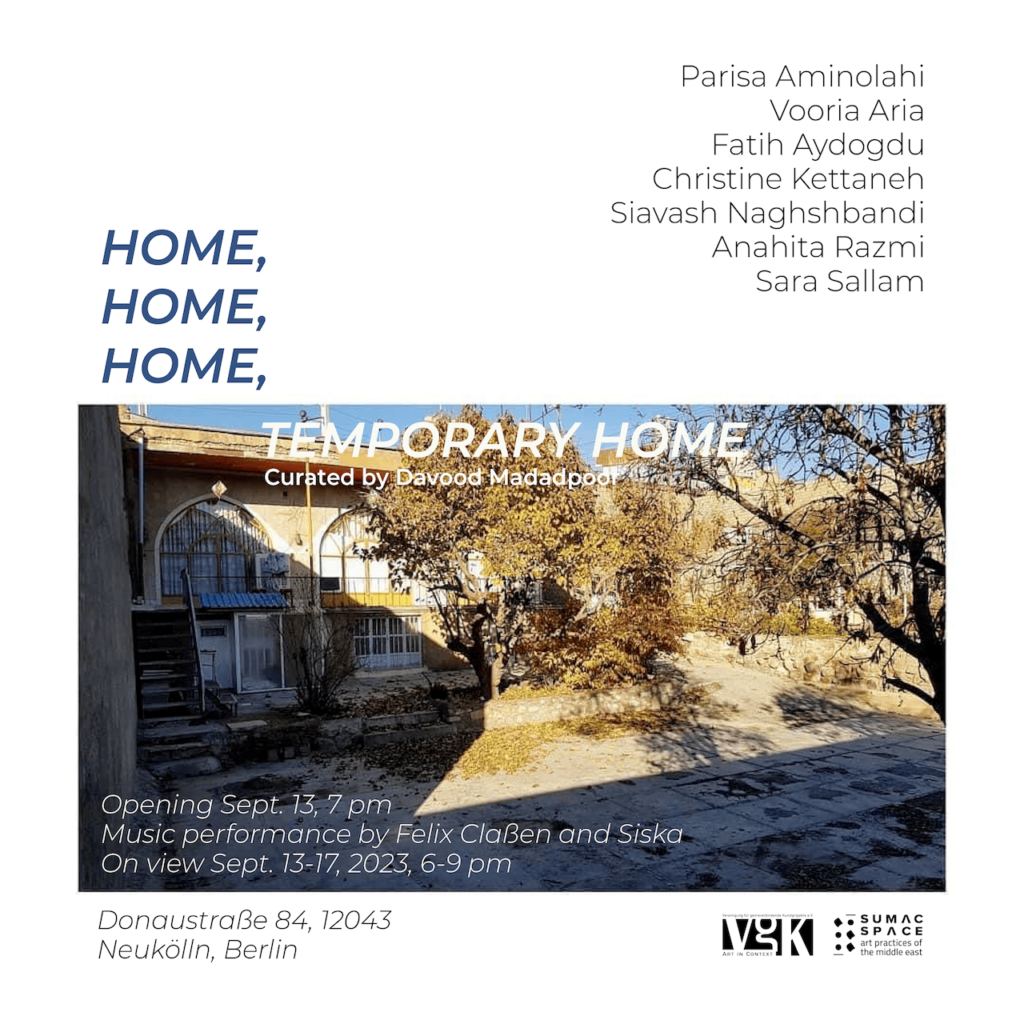
Home, Home, Home, Temporary Home
Parisa Aminolahi, Vooria Aria, Fatih Aydogdu, Christine Kettaneh, Siavash Naghshbandi, Anahita Razmi, Sara Sallam
Curated by Davood Madadpoor
Home, home, home. Temporary home, sublet home. Place with stuff that isn’t mine. I don’t know the contents of the boxes under the bed in which I sleep. I didn’t buy the sheets I use every night. The cat I share the bed with doesn’t know my name. Home, home, home. I get home. Claudia Pagès
The concept of the exhibition is rooted in my continual encounters with change and transformation experienced through my stay in Europe. It began in August 2013, ten years ago, when I settled in a part of Italy, not as a local but as a voyager. After a decade of living in Italy, I decided to embrace a new challenge that involves building a home that holds both physical significance and sentimental value—a place where my dreams can take root and live on. To me, the intent of building a home considers the material structures, the intangible experiences and aspirations for the future.
The exhibition looks at the heavy connotations of “home”, looking at wider socio-political considerations and creating a constructed realm. This realm, perhaps, can only take shape in imagination. A place where constant changes and the swift passage of time have taken the place of contemplation, changes that not only render the concept of time unintelligible but also compel you to ask questions—questions that you carry even within the soil and structure of your home.
The title is borrowed from Claudia Pagès’s book Rage, Home & Insults.
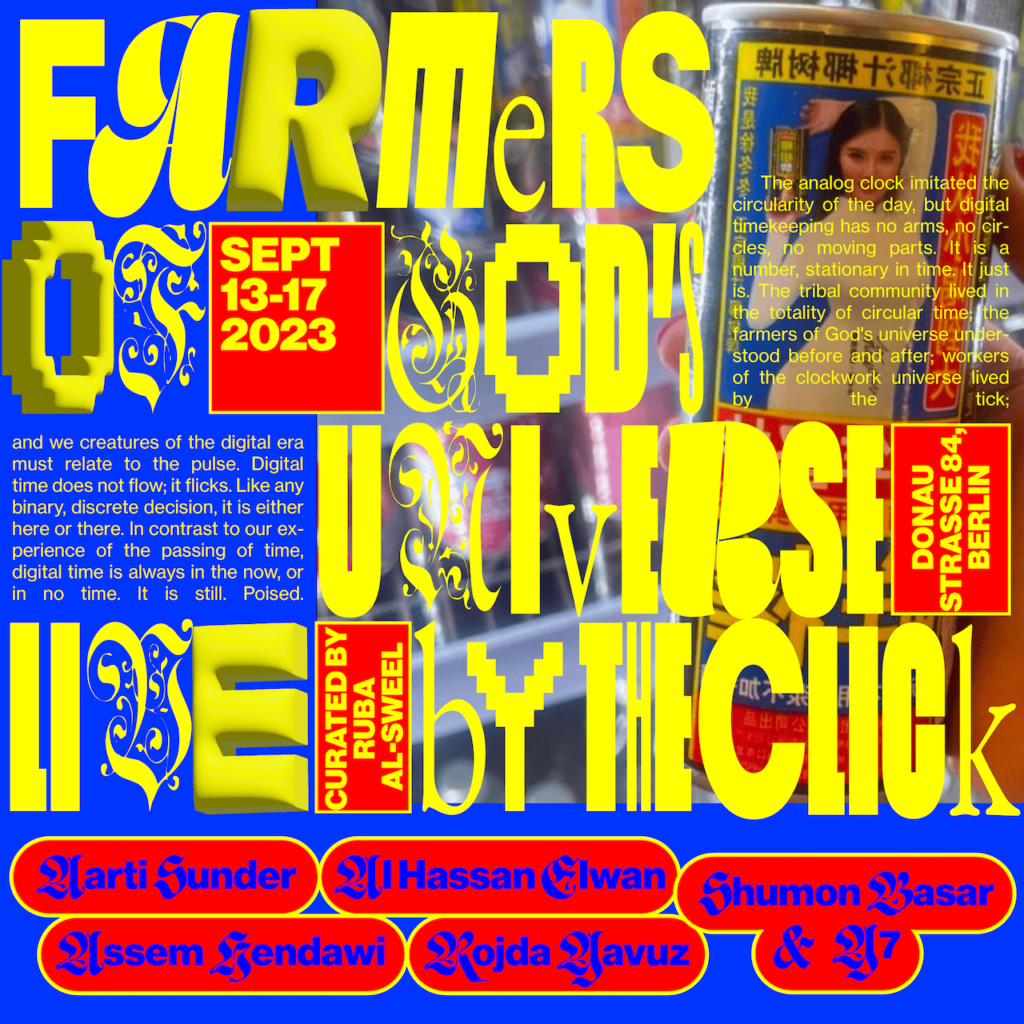
Farmers of god’s universe live by the click
Curated by Ruba Al-Sweel
“The analog clock imitated the circularity of the day, but digital timekeeping has no arms, no circles, no moving parts. It is a number, stationary in time. It just is. The tribal community lived in the totality of circular time; the farmers of God’s universe understood before and after; workers of the clockwork universe lived by the tick; and we creatures of the digital era must relate to the pulse. Digital time does not flow; it flicks. Like any binary, discrete decision, it is either here or there. In contrast to our experience of the passing of time, digital time is always in the now, or in no time. It is still. Poised.” Douglas Rushkoff in ‘Present Shock: When Everything Happens Now’
The image today moves differently. It moves with us, past us and between us. Through a click, a scroll, a flip. In our pockets, on the big and small screen. It’s stitched into the very fibers of our skin as we produce and reproduce projections of ourselves and the world. It flows alongside and against us as markets fluctuate and forces wax and wane. It travels upstream, downstream and everywhere else in between.
This capsule group exhibition presents moving image works by artists who utilize network and digital technologies as medium and material to look at value and time performed online and mediated through screens today.

19:30 – 20:00
Mutaradim مُتَرَدِّمْ, Music Performance
by Felix Claßen and Siska
Mutaradim مُتَرَدِّمْ is the first joint release by Siska & Felix Claßen. Together, they have recorded four pieces that unearth repressed memories, connect historical background noise with anger and newfound aggressiveness, and bring them back to life in musical form.
In the northeastern part of Madagascar, the Indri, a lemur species, is believed to house the souls of deceased people. Due to human interventions in their habitat, this species, also known as the singing ape, is on the brink of extinction. The piercing howl of an Indri marks the beginning of “Mutaradim.” The duo has recorded four pieces in which they uncover repressed memories, intertwine the background noise of history with anger, and resurrect them through music.
“Mutaradim” emerged from a current, immediate impulse. Siska & Felix Claßen seek answers to a catastrophe that leaves one speechless: the explosion of a large quantity of ammonium nitrate on August 4, 2020, in the port of Beirut, which devastated large parts of the city, claimed over 200 lives and deprived many more residents of their livelihoods. Through artistic means, the musicians respond to the asymmetries of power, regimes of misconduct, and their acute consequences, condensed within a reverberating space of overlapping references. (Arno Raffeiner)
Siska was born in Beirut, Lebanon, and currently lives and works in Berlin. He holds a Master’s degree in Film and Audiovisual Arts from the Lebanese Academy of Fine Arts in Beirut. Siska’s work explores personal and collective memories of social and political narratives. His use of film language and cinematic codes to activate an archive allows him to experiment with forms of storytelling and his own biography. At the Haus der Statistics in Berlin in August-2021, he co-curated a series of conversations, films, readings, and live performances as the artistic director of redeem رديم , a platform for ongoing conversations between voices from Beirut in Berlin. Additionally, Siska has produced and performed music as part of the Lebanese hip-hop group Kitaa Beirut قطاع بيروت. Over the past few years, he has collaborated on numerous performances and music productions, taking a midway point between his career as an artist and musician. In 2022, he completed his residency and fellowship at Villa Aurora in Los Angeles.
Felix Claßen is a musician, producer and arts educator from Berlin. He is part of the Duo Lonski & Classen, which has released several albums and has extensively toured across Europe and Japan. For almost 20 years, Felix has been an active voice in the independent music scene of Berlin, curating events that combined different artistic approaches and disciplines as well as running a record label and studio named OSTHAFEN. Besides his current studies for a master’s degree (Art in Context) at the University of the Arts Berlin, Felix hosts sound-related workshops for kids and adults alike. His latest collaborative artistic project “Den Berg Hören” is related to an ecological transformation from the perspectives of sound art, storytelling and choreography.
Day 3: Thursday, September 14
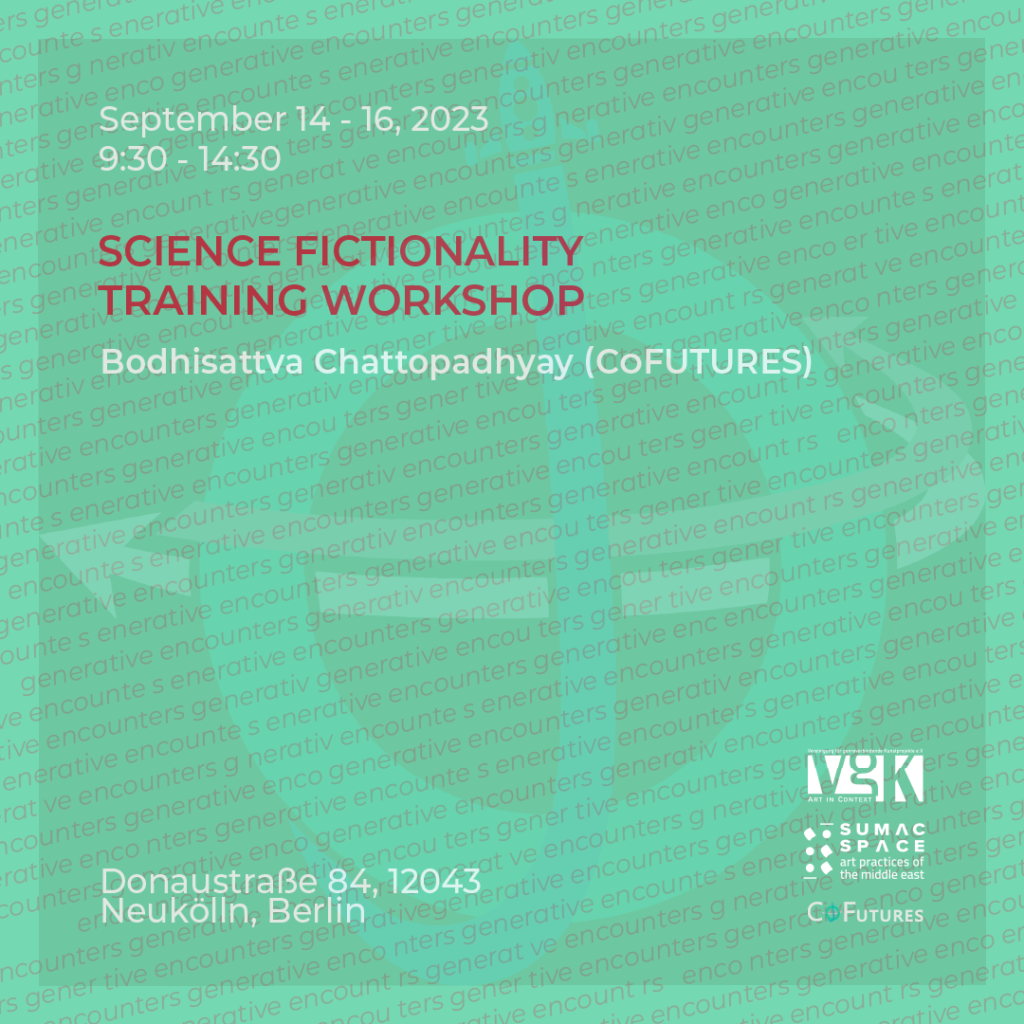
Closed event
Science Fictionality: Training Workshop
by Bodhisattva Chattopadhyay
The CoFUTURES workshops are multi-day training sessions that train participants in worldbuilding, speculative methods, and futurisms. In these workshops, we pair hands-on prototyping activities for participants with instructor led sessions that cover the methods, tools, and strategies used in futures and speculative thinking. Learn more at https://cofutures.org/
The workshop instructors are different members and affiliates of the CoFUTURES group and science fiction writers. In our workshops, we have trained artists, scientists, business professionals, tech industry professionals, innovators, university educators, and environmental activists. Our most recent workshops have been held for United Nations Innovation teams and for scientists at International Space University (France).
The Berlin workshop will be built around different speculative manifestos that will guide practical exercises and discussions. The workshop comprises three theory (strategy) sessions, three activity sessions, and two building sessions. The readings for the theory sessions will be provided.
Participation is free. To do so, kindly email contact@sumac.space with the subject line “Training Workshop.” In the email, please include a brief description of your interest in the workshop topic, along with your relevant experience and personal background.
Bodhisattva Chattopadhyay is Associate Professor in Global Culture Studies at IKOS, University of Oslo, Norway. He leads the international research group CoFUTURES. Chattopadhyay is the leader (PI) of two major research projects funded by the European and Norwegian Research Councils, which explore contemporary global futurisms movements from a transmedial perspective, including literature, film, visual arts, and games. Chattopadhyay runs the Holodeck, a state of the art games research lab at UiO. He is also an Imaginary College Fellow at the Center for Science and the Imagination, Arizona State University. Chattopadhyay is the recipient of numerous awards and prizes, including the World Fantasy Award (2020). Chattopadhyay has written or edited ten books, published numerous articles, exhibited in six transnational art projects, and produced the award-winning film Kalpavigyan: A Speculative Journey, the first documentary on science fiction from India and Bengal.
18:00 – 19:00
POSTPOSTPOST Meetup!
Meet and devirtualize with the PPP community, hard on the heels of the freshly printed publication ‘POSTPOSTPOST: Reflections on a New Avant-Garde’, Volume l. https://postpostpost.com/
‘POSTPOSTPOST: Reflections on a New Avant-garde’ is a 274-pager billed as an ‘anti-manifesto’ for a new cultural frontier, home to original essays by and interviews with over 30 writers, artists, designers, academics, and thinkers across a wide geography.
Co-edited by multidisciplinary designer, architect and Creative Director Alhassan Elwan and writer, curator and new media researcher Ruba Al-Sweel.
Day 4: Friday, September 15
Closed event
Science Fictionality: Training Workshop
by Bodhisattva Chattopadhyay
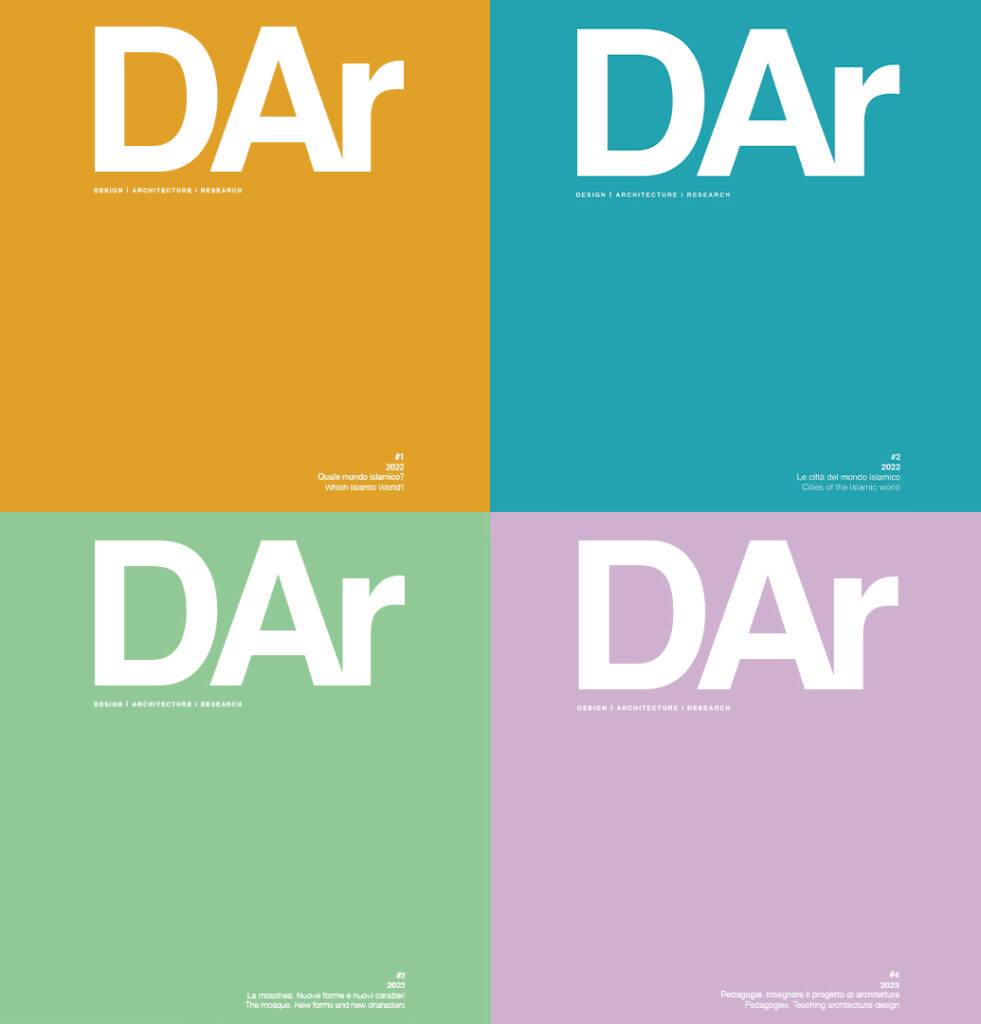
19:00 – 19:45
DAr in Berlin
Presentation of DAr – international journal of architecture in the Islamic world, in conversation with Sumac Space (Davood Madadpoor), DAr (Eliana Martinelli, Cecilia Fumagalli, Chiara Simoncini) and VgK-Art in Context (Amelie Conrad)
DAr. Design, Architecture, Research is an biannual international journal aimed at investigating the Islamic culture from the point of view of the architectural and urban design, without referring to specific geographical areas of l Dar-al-Islam and addressing also those architectural and urban characters of the Islamic world that are being consolidating outside its traditional limits. Although the journal aims above all to deepen and consolidate the formal architectural values of the Islamic world, it fosters at the same time an exchange of knowledge between architectural and urban composition and landscape architecture, interior design, history and criticism, philosophy, anthropology and sociology, having as its ultimate goal the reflection on the city, intended as an inclusive and intercultural large house (Dār in Arabic).
Cecilia Fumagalli (1983) is an architect. She received her Master’s degree in Architecture from Politecnico di Milano in 2009. Since then, she has been engaged in several architectural and urban conservation projects in Morocco, Malaysia, Mauritania and Saudi Arabia. Convinced of the strict link between theory, practice, and teaching, she completed in 2017 her PhD in Architectural Composition with honours. From 2017 to 2022, she has been teaching in Architecture faculties in Italy and abroad. In 2019, she cofounded NOSTOI (DAr’s editor) for the promotion of the architectural and urban culture of the Mediterranean, North Africa and the Middle and Near Easts.
Eliana Martinelli (1987) is an architect and Assistant Professor at the University of Perugia, Dpt of Civil and Environmental Engineering. In 2017, she completed a PhD in Architectural Composition with honours at the IUAV University of Venice. She has been teaching positions at the Université Euromed de Fes (Morocco), University of Pisa, Federico II University of Naples, SRH Heidelberg (Germany) and the University of Florence. She has been a research fellow in the field of the regeneration of architectural heritage by involving the communities. She publishes numerous essays, coordinates design workshops and participates in international conferences and seminars on these topics.
Chiara Simoncini (1996) is an architect and a Ph.D. candidate in Architectural and Urban Design at the University of Florence. Since 2021, she has been a lecturer in the Architectural Design and Interior Design laboratories. Between 2022 and 2023, she was a doctoral researcher at the University of Miami, College of Civil & Architectural Engineering, specializing in Ocean Sciences & Architecture. Her published work revolves around her main research interests, which include Mediterranean architecture with a particular emphasis on the conservation of the landscape of small coastal towns and the modernist architectural heritage of vernacular realities in the former Socialist Soviet Republics.
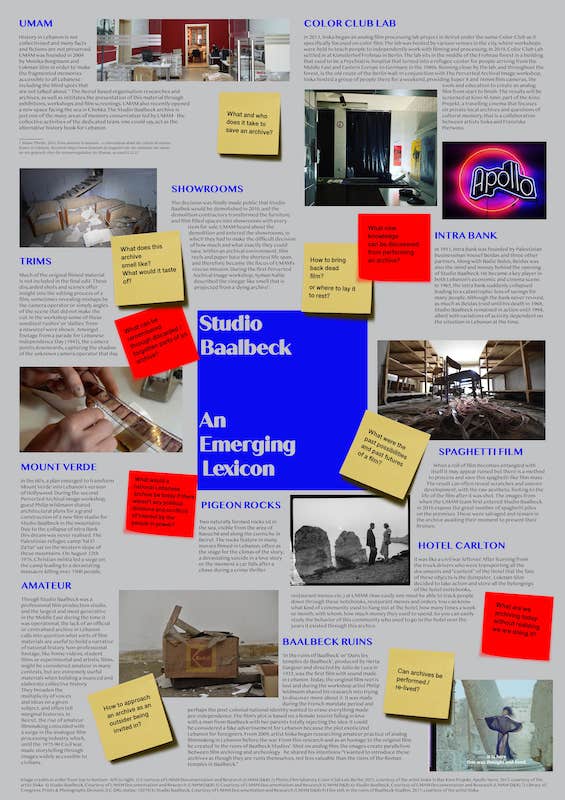
20:00 – 20:45
Studio Baalbeck – An Emerging Lexicon
Film screening & conversation with Clementine Butler-Gallie & Siska
Focusing on the archives of Studio Baalbeck – what could be thought of as a national film heritage of Lebanon – the workshop focused on outlining and exploring the intermingled economies that shape and surround cultural production in general and the film industry in specific. How do the specific geopolitics of a region unfold through the labor of individuals and institutions? How can archival work – through research and reconstruction – draw out the intricacies of local and global economic, political, and personal structures? The Perverted Archival Image workshop centered on and tentacled off from Studio Baalbeck. The workshop participants created an audio montage of recordings to accompany some of the visual archive material and a lexicon was constructed as a tool in attempting to make legible the unknowns of the Studio Baalbeck Archive. This lexicon will act as a map to guide the screening and conversation. The workshop was convened by Ayman Nahle and Siska and took place online from October 2021 – March 2022 as part of the Whole Life Academy Berlin.
Siska was born in Beirut, Lebanon, and currently lives and works in Berlin. He holds a Master’s degree in Film and Audiovisual Arts from the Lebanese Academy of Fine Arts in Beirut. Siska’s work explores personal and collective memories of social and political narratives. His use of film language and cinematic codes to activate an archive allows him to experiment with forms of storytelling and his own biography. At the Haus der Statistics in Berlin in August-2021, he co-curated a series of conversations, films, readings, and live performances as the artistic director of redeem رديم , a platform for ongoing conversations between voices from Beirut in Berlin. Additionally, Siska has produced and performed music as part of the Lebanese hip-hop group Kitaa Beirut قطاع بيروت. Over the past few years, he has collaborated on numerous performances and music productions, taking a midway point between his career as an artist and musician. In 2022, he completed his residency and fellowship at Villa Aurora in Los Angeles.
Clementine Butler-Gallie works in the field of curation and artistic research with an interest in future spaces for and past stories of cultural exchange and encounter. She works on curatorial projects for Arts Cabinet, a pluri-disciplinary research platform that functions as a space to experiment with different forms of artistic knowledge production, she co-organises the curatorial network ‘Continued Conversations’, and is an editor at JAWS journal. Her various projects have been in collaboration with spaces such as HALLE 14, Leipzig; Mansion, Beirut; Feldfünf, Berlin; CAP, Kuwait, among others. Her current research project titled ReRouting explores the potential in walking as a curatorial space with a specific focus on collective action on sites of division.
Day 5: Saturday, September 16
Closed event
Science Fictionality: Training Workshop
by Bodhisattva Chattopadhyay
Day 6: Sunday September 17
9 am – 4 pm closed event
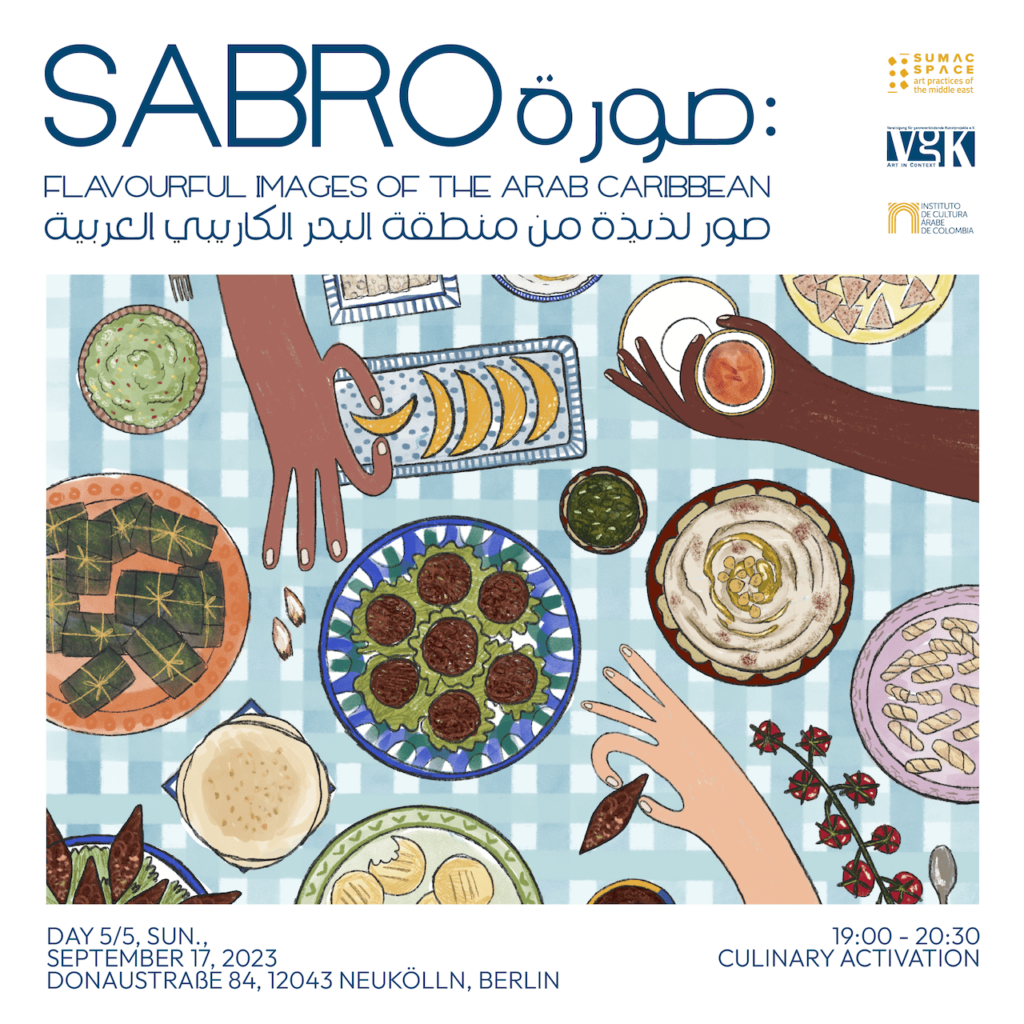
19:00 – 20:30
SabroSura Sabro صورة: Flavorful Images of the Arab Caribbean
صور لذيذة من منطقة البحر الكاريبي العربية
by Instituto de Cultura Árabe de Colombia
The Arab Culture Institute of Colombia invites you to the culinary activation: “SabroSura: Flavorful Images of the Arab Caribbean”. SabroSura is an ephemeral space to celebrate the encounter and merging of Arab* and Latin American* cultures on the Caribbean coasts of the American continent. We taste firsthand the flavors of this region and dare to create new culinary pairings while visualizing migratory processes and culinary encounters of the thousands of Arab migrants that arrived during the 19th and 20th centuries, and their descendants.
In the 19th and 20th centuries, millions of Arabs left their countries to go to “Amrika”, an uncertain share of land across the ocean. Most of them first arrived on the Caribbean coasts of some countries and later moved inland. Often and erroneously called “Turks”, they brought little to no material possessions, but an immense repertory of memories and cultural practices that connected them to their homelands and also allowed them to tie in with their host societies. Decades after, the “Arab Caribbean” region is present in Colombia and other Latin American countries. Nowadays, the distinction between the once “local” and what was once “foreign” becomes blurred and turns into the quotidian. It is a place of traditions and sentiments evoked through various practices, especially culinary ones. A region where recipes and ingredients carried through oceans by the Arab diaspora are used on a daily basis as part of the local cuisine. Gabriel García Márquez captured facets of this multicultural territory that embodies Magical Realism in his novel One Hundred Years of Solitude. Join us as we explore the many possibilities within the “Arab Caribbean,” a region that is imaginary, yet real.
* Arab and Latin American are broad and fluid terms that may not fully encompass the realities of communities associated with them. These terms are worthy of critique and revisitation in a post-colonial context.
Instituto de Cultura Árabe de Colombia Established in 2017 as a not-for-profit, non-political and non-religious independent organization based in Barranquilla, Colombia, the Institute of Arab Culture of Colombia aims to connect through multiple channels in Colombia and the Arab-Latin Diaspora with the Arab-speaking world. The Institute serves and is recognised today as a platform to generate intercultural dialogue and to bolster opportunities of growth and development between the regions and amongst its peoples through art, culture, research and other related interactions.
GENERATIVE ENCOUNTERS–A FIVE-DAY CREATION AND RECIPROCITY
A project by Vereinigung für genreverbindende Kunstprojekte in collaboration with Sumac Space
Conceived by Amelie Conrad / Davood Madadpoor
Vereinigung für genreverbindende Kunstprojekte (VgK) was founded in Berlin in 2004 and is dedicated to the production and mediation of new artistic strategies in visual arts, theater, music, and literature in cooperation with universities, private and state-subsidized cultural institutions and municipalities. The central focus of the Berlin art association is the intersection of science and art, which is increasingly crucial in our globalized modern knowledge society. Considering cultural diversity and the identity of nations, art plays a crucial role in enhancing our understanding of the world as a cultural space.
In this field, the VgK conceived and curated the annual artist-in-residence program PHYSIS – A European project for interdisciplinary art, process-oriented, and conceptual work. PHYSIS is annually presented with an extensive supporting program and exhibition cycles in Germany, Italy and Greece. With the initiative International Youth and Autumn Academy Assisi, the VgK offers additionally a program for youth and young adults in the spectrum of science, art and intercultural dialogue. cc-art-context.de
Sumac Space–Art Practices of the Middle East launched as a digital platform in October 2020 with the aim of addressing challenging social and political thematics within specific geographies. Through dialogue, alternative forms of research, and collaboration, Sumac prioritizes critical thinking as integral to the process and practice of creating. Sumac investigates these aims with different programs—from symposia, panel discussions, artist talks, and experimental forms of publishing to discursive online and physical exhibitions, including au-delà in Berlin (DE), and The Tellers in Florence (IT), along with collaborative work on Echoes—a series of encounters for young participants; DAr—a bi-annual journal on Islamic world architecture; a symposium at Villa Romana, and On Ongoing—a series of five-panel discussions. www.sumac.space
We thank all participating partners for their contribution.
The international professional encounter is supported by BKJ.